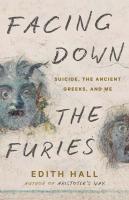
Yale (2023) h/b 242pp £17.85 (ISBN 9780300273533)
This is a timely book, because the legacy of the pandemic has seen a sharp rise in mental health crises in society; compassionate, because it refuses to judge the people she discusses; and brave, because she opens up about her own experience of suicidal ideation and familial grief.
H. takes us through the stories of her family and explores their battles with mental health (linked in some cases to relationship problems and alcohol). Her great-grandfather had a life which could well have graced the pages of a Thomas Hardy novel, rising from lowly roots to high office in the town of Dunbar where he took his own life by drowning. Her eponymous grandmother could enjoy the good things of life and certainly had no financial problems but was catatonic with depression for weeks on end. When this grandmother threw herself to her death from a hotel window, H.’s mother never got over the shock and the author’s childhood was blighted by this traumatic event even though—or perhaps because—her mother did not talk about it. Her mother’s cousin Alex shot himself in 1959. H. herself almost ended her life just before taking her finals at Oxford in 1982. This is where tragedy enters the narrative, as something like the family curse as seen in the houses of Atreus and Laius was alive and well in the family of this author: and those furies who harass Orestes have long harassed H.
In the course of this well written (and excellently proof-read) book, H. discusses several different aspects of suicide. There is the ‘heroic’ suicide performed by a man of honour in the face of disgrace (such as Ajax), or the suicide of sheer despair in the wake of guilt and shame (think Heracles after killing his children, or Jocasta on discovering the truth about her son). She mentions but does not dwell on the Stoic suicides (Cato of Utica, for instance) which show suicide as a political act—the last action available to a person of principle whose power has been removed—as seen also in the case of Cleopatra which was stirring enough to inspire one of the finest of Horace’s Odes (1.37).
What makes this book so successful is that her family saga allows her to create a narrative which is both personal and universal, which shows first-hand the detail of the damage which suicide causes while also seeing it as something which affects every human being on the planet. The timeless tragedies, in parallel with her family story, add a level of profundity to her tale and show us how this author has successfully used the texts of the ancient Greeks to come to terms with personal and familial trauma. H. also gives us a brief account of other attitudes towards suicide from the Romans to the 19th century in a brisk chapter on the key question of ‘who is damaged by suicide?’, but it is the Greek plays which dominate the book and its author throughout.
She brings in some of the most engaging plays ever written: Aeschylus’ Agamemnon shows the family curse at work and the infamous Furies who enact it, Sophocles’ Ajax shows us a mighty fallen warrior using the sort of deception tactics which many people adopt to enable themselves to commit suicide without interruption. Female suicides are shown in cases such as Evadne in Euripides Supplices, Eurydice in Sophocles’ Antigone, Phaedra in Euripides’ Hippolytus and Deianeira in Trachiniae. These poignant tales show both the causes and the ghastly effects of suicide on the family and on wider society—helping to answer (with help from Aristotle) the misplaced opinion that suicide only harms the individual. In the case of Deianeira, H. puts it beautifully: ‘[Heracles’] gentle wife’s depression, her despair at discovering that Heracles loves someone else, her silly mistake over the ointment and her precipitate decision to die are all handled with the greatest delicacy… [her son] Hyllus’ devastation at losing her could not be described with greater tenderness’ (p.136). Euripides’ Alcestis raises the stakes even higher. Her death is lamented by a solo voice from her bereaved little son to show the family devastated by her death, while her feeble husband is shown up as unable to keep his promise of staying unmarried even for a single day. Even though Alcestis comes back to life—courtesy of the intervention of Heracles—her family (like that of every suicide victim) will never be the same again.
The final chapter brings in what is arguably the finest account in Greek tragedy of the issues concerning suicide—even though nobody actually kills themselves. Euripides’ Heracles (in a fit of madness brought on by the jealous Hera) murders his beloved wife and children and (understandably) wishes to end his own life in a paroxysm of self-loathing and shame. His foster-father Amphitryon and his best friend Theseus talk him round with ‘a combination of non-judgementalism, physical support, affirmations of loyalty, acknowledgement of the scale of his suffering, disdain for the superstitious shunning of those involved in violence, expression of deep sympathy, reminders of how much he is loved and needed, and extensive quiet listening’ (p.189). As a list of the qualities needed in someone helping to talk down a suicide, this would be hard to better.
H. ends this sad book with a final section of hope over despair, both in the life of Heracles and in her own life, as she describes herself and her husband visiting the places haunted by the ghosts of her ancestors whom she has so movingly brought to life for us, and showing how she has finally succeeded in exorcising the past and facing down the Furies.
John Godwin
